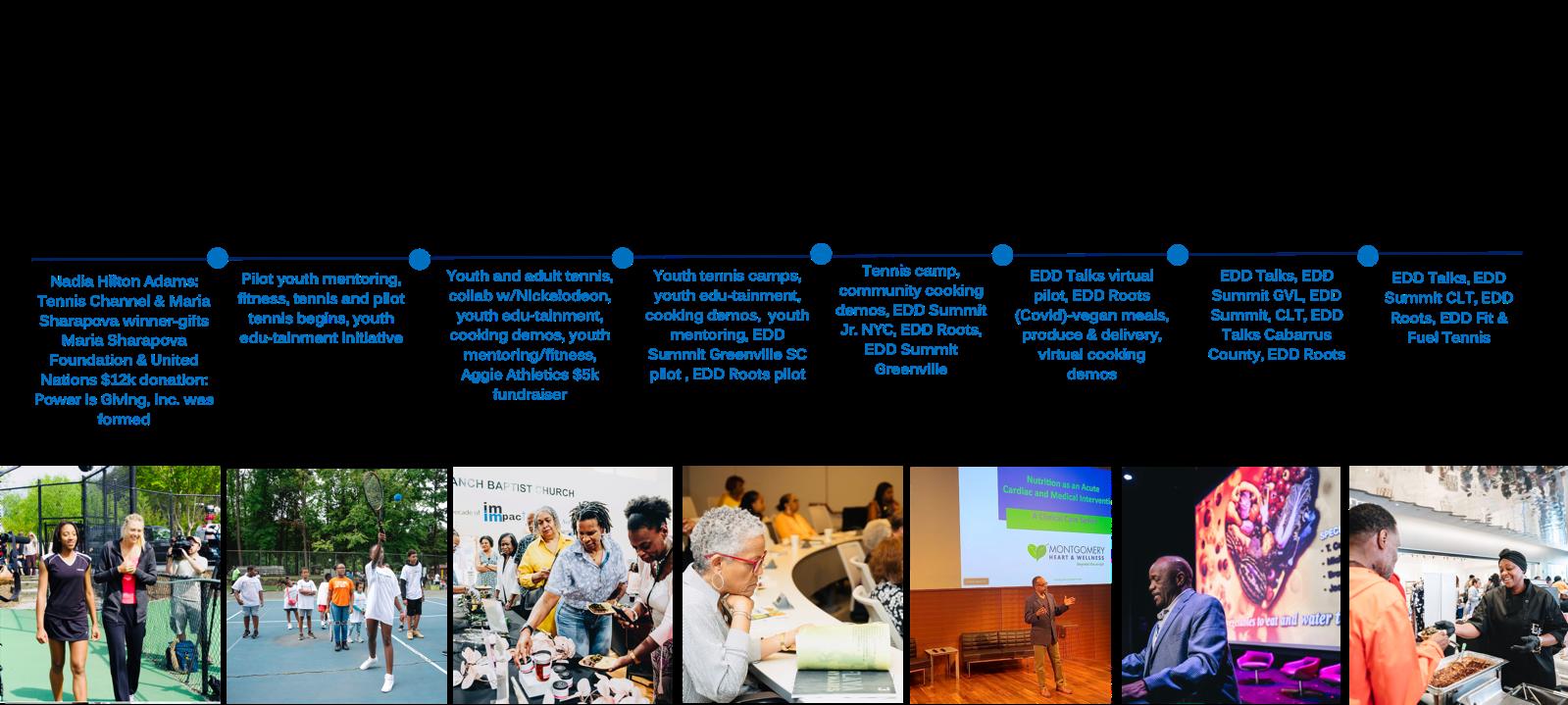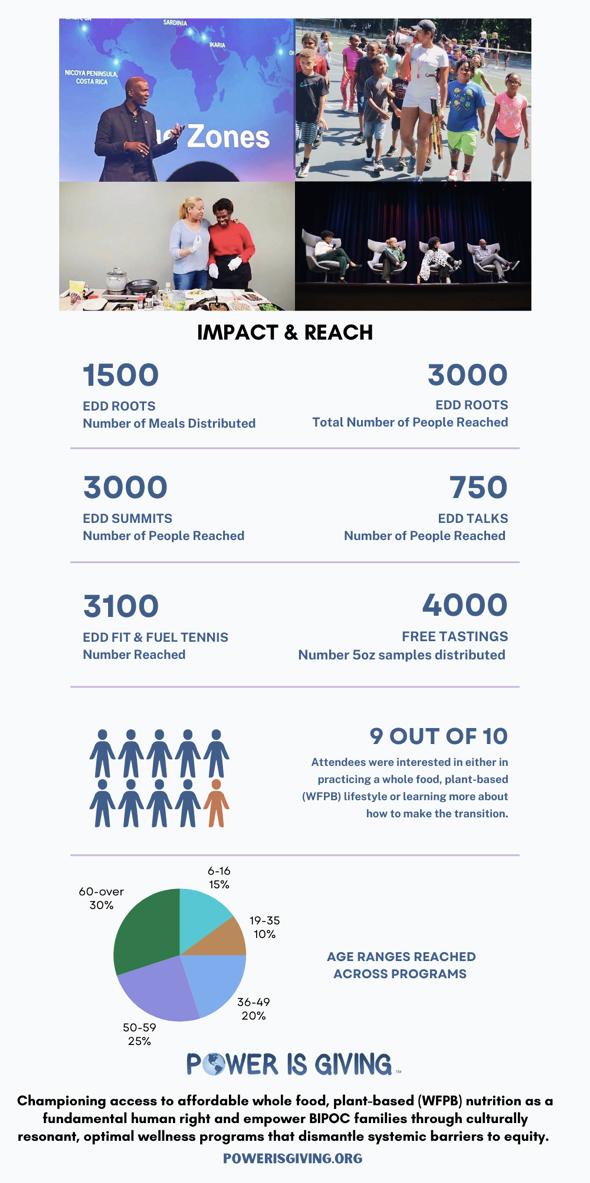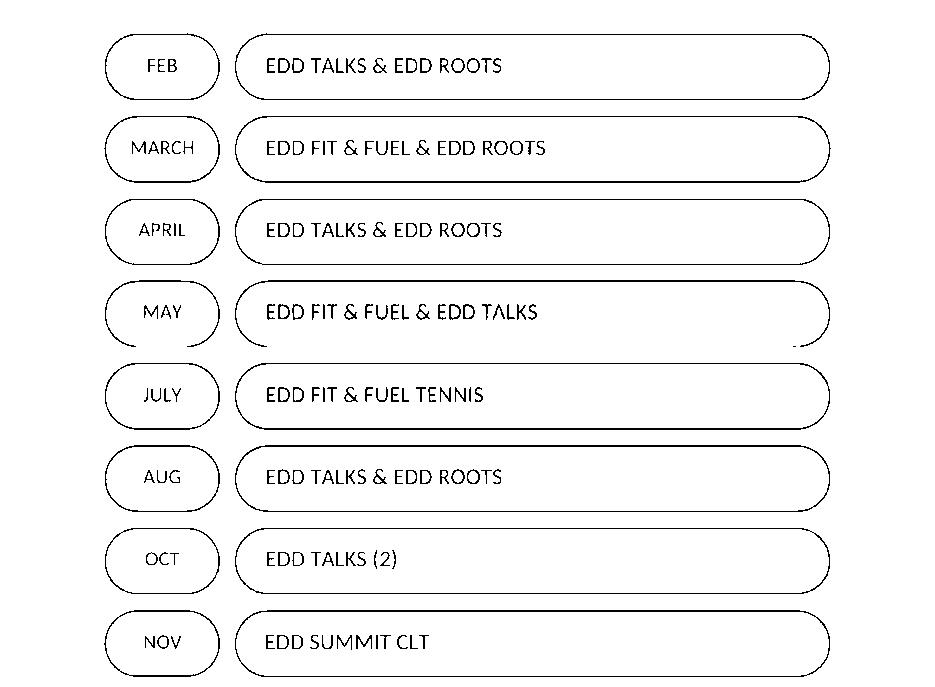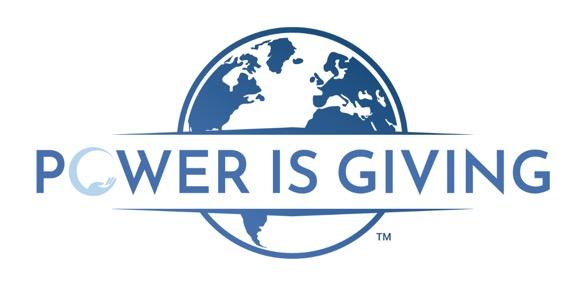




















In an effort to transform lives and dismantle systemic barriers to wellness equity, Power is Giving provides whole food, plant-based (WFPB) restoraCve lifestyle educaCon, resources and advocacy with a targeted focus on Black, Indigenous, and People of Color (BIPOC) communiCes.
MISSION STATEMENT
To champion access to affordable WFPB nutriCon as a fundamental human right and empower BIPOC families through culturally resonant, opCmal wellness programs that aid in the dismantling of systemic barriers to equity.
Thriving, equitable communiCes where BIPOC families experience opCmal health, enduring intergeneraConal wellness and equitable access to the knowledge, resources, and opportuniCes necessary to build lasCng personal and community wealth.
We believe affordable access to 100% whole food, plant-based (WFPB) and healthy vegan nutriCon is a basic human right. Guiding principles like evidence-based science, equity, educaCon and cultural competency drive us as we work collaboraCvely alongside clinicians, chefs and subject maNer experts to aid in dismantling systemic wellness barriers such as nutriCon redlining that disproporConately impact BIPOC communiCes.
ORGANIZATIONAL OVERVIEW
Founded in 2011 on the principle that opCmal wellness and the disseminaCon of evidence-based educaCon, advocacy and access to fresh fruits and vegetables are fundamental human rights, Power is Giving is dedicated to combaCng systemic inequiCes like nutriCon redlining and food apartheid through its year-round, BIPOC-focused programs and collaboraCve iniCaCves.
As nutriCon redlining represents deeply rooted racial and economic pracCces that have normalized the denial of nutriCve resource access, they have also spawned food apartheid communiCes and the creaCon of food swamps, which occur in geographic areas where retail abandonment has occurred and subsequently given way to an onslaught of convenience stores and fast-food outlets offering cheap, chronic disease promoCng, highly processed foods.
Notably, a 2012 study published in the American Journal of Public Health also underscored the prevalence of food swamps in Black and Brown communiCes at a rate 3 Cmes higher than more affluent communiCes, which further exacerbaCng chronic disease rates and health dispariCes.
As our presentaCon of evidence-based, whole food plant-based (WFPB) nutriCon experCse and related clinical educaCon and culinary programming aligns with our commitment to equity and cultural competency, our vision for thriving, equitable communiCes where BIPOC families and veterans aNain opCmal and enduring intergeneraConal wellness will be achieved.
This programmaCcally

Housed under the umbrella name "Eat, Drink, Disrupt ” (EDD), which represents our across program efforts to miCgate, we also focus on combaCng wellness inequality by ensuring that all of our programs and iniCaCves are culturally resonant and WFPB.
1. EDD FIT AND FUEL TENNIS: With a goal of combaCng childhood and juvenile obesity and insClling lifelong habits of opCmal wellness this free ½ day program engages youth ages 6-16 through culturally resonant tennis training, fitness coaching, nutriCon and mentorship. Led by former NCAA Division 1 & 2 tennis players and former collegiate NFL and professional fitness experts, we combine physical acCvity with introducCon of healthy vegan meals, snacks and opportuniCes to be matched with our coach-mentors.
2. EDD TALKS LUNCH AND LEARN: Our free, 90-minute WFPB lunch and learn program includes an inperson and/or virtual, physician-led chronic disease prevenCon and arrest presentaCon, Q & A with physician and local nutriCon expert, a chef curated, culturally resonant vegan lunch and evidencebased takeaway resources to support transiCon to a WFPB lifestyle.
3. EDD ROOTS: With a focus on in-person and virtual community partnerships with exisCng organizaCons in service to our target populaCon(s), we provide cooking demos, educaConal presentaCons and resources to curated partner organizaCon audiences that have an interest in introducing the opCmal wellness benefits of a WFPB lifestyle to their members and consCtuents.
4. EDD SUMMIT: TargeCng BIPOC communiCes, our ½ day program serves as a convergence point and call to acCon that fosters health, nutriCon and financial wellbeing while providing BIPOC clinicians, entrepreneurs, chefs and subject maNer experts a plaform to reach and teach liberaCon and empowerment.
ENVIRONMENTAL ANALYSIS
Heart disease naConally reigns as America's #1 killer, driving 1 in 4 deaths annually with cancer as #2 claiming 600,000 ciCzens each year.
Healthcare spending already accounts for nearly 20% of GDP (4.3 trillion) and at this trajectory suggests that in 2025, almost half of the US population over 80 years old may be living with at least one largely preventable, diet-related chronic disease.
Entangled within these chronic disease burdens, alarming health and wellness disparities are concentrated among African American and Latino communities who die of heart disease, stroke and diabetes complications 50%, 35% and 100% more respectively than white populations.
• African Americans are 30% more likely to die from heart disease than non-Hispanic whites
• The stroke mortality rate for African Americans is 40% higher than for whites
• The diabetes death rate for African Americans is 2 times that of non-Hispanic whites
At the county level, both Mecklenburg County NC and Greenville County SC report heart disease mortality rates for African American residents averaging 1.5 Cmes higher and obesity rates effect over 40% of BIPOC ciCzens in both counCes.
• Mecklenburg County, NC, heart disease mortality rates for African American residents are 1.4 Cmes higher than for white residents
• Mecklenburg County, NC African Americans living with type 2 diabetes are also double that of white residents
• Obesity esCmates also afflict over 45% of Mecklenburg County NC ’s BIPOC ciCzens exacerbaCng suscepCbility to hypertension, cancers and debilitaCng joint diseases.
• In Greenville County, SC, African Americans are 1.6 times more likely to die from heart disease compared to white residents
Children are not spared as childhood obesity tripled since the 1990s and concentrates within lower income African American and Latino youth at disproportionate crisis levels. Childhood obesity rates among children and adolescents aged 2-19 years reached 19.7% in 2023.
These statistics highlight the persistent and worsening health inequities facing BIPOC communities, underscoring the critical importance of Power is Giving's mission and programs.
The largely systemic exclusion of marginalized BIPOC communiCes from affordable supermarkets and nutriCous whole food outlets has led to severe forms of nutriCon redlining and food apartheid across America. With few opCons beyond unhealthy fast-food chains and heavily processed convenience store items, condiCons promoCng diet-fueled chronic illness concentrate significantly in zip codes that remain socially disadvantaged by policy and business flight.
Research confirms that implemenCng evidence-derived, WFPB advocacy, clinical, culinary and fitness pathways to wellness through an equity lens that confronts the insCtuConal barriers responsible for nutriConal redlining serves as powerful qualitaCve and quanCtaCve intervenConal tools.
Power is Giving Inc. prioriCzes BIPOC youth (ages 6-17) and adults in CharloNe, NC and Greenville, SC along who suffer from diet-related chronic illnesses in these areas.
This strategic focus acknowledges the unique nutriConal and health challenges faced by these groups due to systemic food injusCces, such as food apartheid and nutriCon redlining. The organizaCon's programs, tailored to address the specific needs of these priority populaCons, aim to empower them with knowledge, access, and resources for a whole food, plant-based lifestyle, driving access to informaCon and resources that can bring about change in health outcomes and that promote nutriConal equity.
Power is Giving's expansive programming strives to provide targeted BIPOC community accessible wellness educaCon while sparking interest in sustained lifestyle changes for populaCons impacted by health inequiCes. Over Cme, we have reached and informed thousands in North Carolina, South Carolina and New York on evidence-backed nutriCon strategies and food jusCce issues.

HEALTH & LIFESTYLE
1. Reduced Risk of Chronic Diseases
Through our core programs, over 9,500 community members have received 100% whole food, plantbased (WFPB) wellness educaCon resources, with 9 out of 10 on conveying interest either adopCng a WFPB lifestyle or a desire to learn more about how to do so arer parCcipaCng in one of our programs or collaboraCve iniCaCves.
Research underscores a WFPB lifestyle and its’ role in lowering the incidence of heart disease, obesity diabetes and hypertension, which are also condiCons that disproporConately affect BIPOC youth and adult populaCons.
2. Improved Metabolic Health
AdopCon of a WFPB lifestyle can significantly enhance metabolic health markers, directly impacCng overall well-being and longevity.
3.
Beyond physical health, WFPB lifestyles contribute to beNer mood, increased energy levels and improved sleep quality.
4. EducaUonal Impact
Provides essenCal knowledge about how to source and prepare as well as the opCmal nutriConal benefits of a WFPB lifestyle.
1. Reduced Healthcare Costs
By promoCng a WFPB lifestyle, our programs can aid in helping to lower the prevalence of dietrelated chronic diseases, potenCally reducing healthcare expenses which represented over well over 20% of US GDP (pre-covid).
2. Improves Public Health
With a focus on prevenCon, arrest and reversal of chronic illnesses, our programs contribute to a more informed and evidence-minded community and the potenCal for improved health outcomes; parCcularly among those disproporConately impacted by preventable and arrestable, diet-driven chronic diseases.
1. Reduced Carbon Footprint
WFPB lifestyles are associated with significantly lower greenhouse gas emissions compared to diets high in animal products. By encouraging WFPB and healthy vegan lifestyles, we help miCgate climate change; offering a healthier planet for future generaCons.
2. ConservaUon of Natural Resources
WFPB lifestyles require significantly less water and land usage, which contributes to the preservaCon of vital ecosystems.
3. Biodiversity ProtecUon
TransiConing toward a WFPB lifestyle supports biodiversity by reducing the need for monoculture farming and preserving natural habitats.
1. Expand WFPB and Vegan EducaUon within BIPOC communiUes
Extend accessible, culturally tailored, and evidence-backed WFPB educaCon to BIPOC communiCes disproporConately affected by health inequiCes. This includes enhancing outreach, developing new educaConal resources, expanded programming opportuniCes and securing the funding necessary for program sustainability.
2. Improve Wellness Equity Advocacy
Strategically dismantle barriers to WFPB lifestyle and healthy food access within BIPOC communiCes through advocacy, building community partnerships, and increasing operaConal capacity with necessary funding.
3. Encourage Healthy Lifestyle Habits
Promote physical well-being, self-esteem, and help miCgate childhood and juvenile obesity by providing culturally resonant tennis and fitness programs for youth and robust and evidence-based programs, that include the importance of exercise for adults of all ages.
4. Secure OperaUonal & Program Funding
TransiCon to a fully funded program and operaCng model that will enable us to employ key staff and contractors while simultaneously safeguarding program and organizaConal longevity. This priority underscores the importance of financial sustainability as well as an ability to consistently fulfill our mission.

We have demonstrated remarkable resilience while simultaneously advancing opCmal wellness equity and educaCon within BIPOC communiCes in CharloNe-Mecklenburg NC, Greenville County SC. Since our incepCon, we’ve been buoyed by the dedicaCon of our volunteers, achieving significant milestones without the benefit of a funded operaCng budget and a parCally funded programs budget.
Despite our notable impact and achievements experienced as an underfunded organizaCon, we recognize the need for a sustainable model to amplify our impact within our priority populaCons. To this end, we must secure full funding for our operaCons and program budgets year over year, as this will enable us to secure contractors, staff and conCnue delivering evidence-based, transformaCve life-changing programs with even greater impact.
Free, 90-minute program includes a chef-curated, culturally resonant WFPB lunch, a 30-minute physicianled chronic disease prevenCon and arrest presentaCon, Q& A, a clinically endorsed cookbook and other clinically-derived and evidence based take-home wellness resources for up to 60 parCcipants per program
Set to engage up to 85 BIPOC youth ages 6-17, this ½ day feature a half-day of program includes a healthy and kid friendly vegan lunch, WFPB lunches, vegan snacks, training with BIPOC former division 1 & 2 tennis & football athletes coaching takeaway wellness resources and mentorship opportuniCes.
A ½ day hallmark call to acCon program reaches over 400 individuals in person and up to an addiConal 600 virtually. An opCmal wellness and equity soluCons gathering for everyone from BIPOC small business owners, vegans and community acCvists to health professionals, poliCcians or anyone desiring a powerful, reach, teach and tasCng experience, we convene clinicians, chefs, equity maNer experts and more to forward the conversaCon around transformaCve and sustainable change.
For those unable to parCcipate in our year-round programs, we work with like-focused, community organizaCons to present WFPB cooking demos, tasCngs and other free WFPB wellness resources that support educaCng their parCcipants, members or consCtuents.
While listed as operaConal expenses within our budget, we have never successfully secured operaConal funds to pay contractors or staff. The organizaConal chart below represents skeleton team who supports us voluntarily or at a severely underpaid rate.
These dedicated professionals contribute their Cme and experCse and have been fundamental to our many years of programmaCc success. Therefore, our goal is to secure year over year funding so that we can begin fairly compensaCng them in the 2025 operaConal cycle.
As we look to the future, our strategic goal is to secure funding that allow us to transiCon to a sustainably staffed organizaCon model, thus enabling us to create a cohesive team with the resources and support they require while concurrently maximizing our capacity to serve community.

Power is Giving remains committed to its mission of championing access to affordable whole food, plantbased (WFPB) nutrition as a fundamental human right. Our strategic plan for 2025 reinforces our dedication to empowering BIPOC families through culturally resonant, optimal wellness programs that dismantle systemic barriers to equity.
1. Strengthen our efforts to improve wellness equity
2. Encourage transformative lifestyle changes through our WFPB education and programs
3. Secure and maintain full operational and program funding
4. Develop more collaborative partnerships for greater community impact
By concentrating on these priorities, we’ll continue to make significant strides toward our vision of thriving, equitable communities where BIPOC families experience optimal lifestyle education and enduring intergenerational wellness.